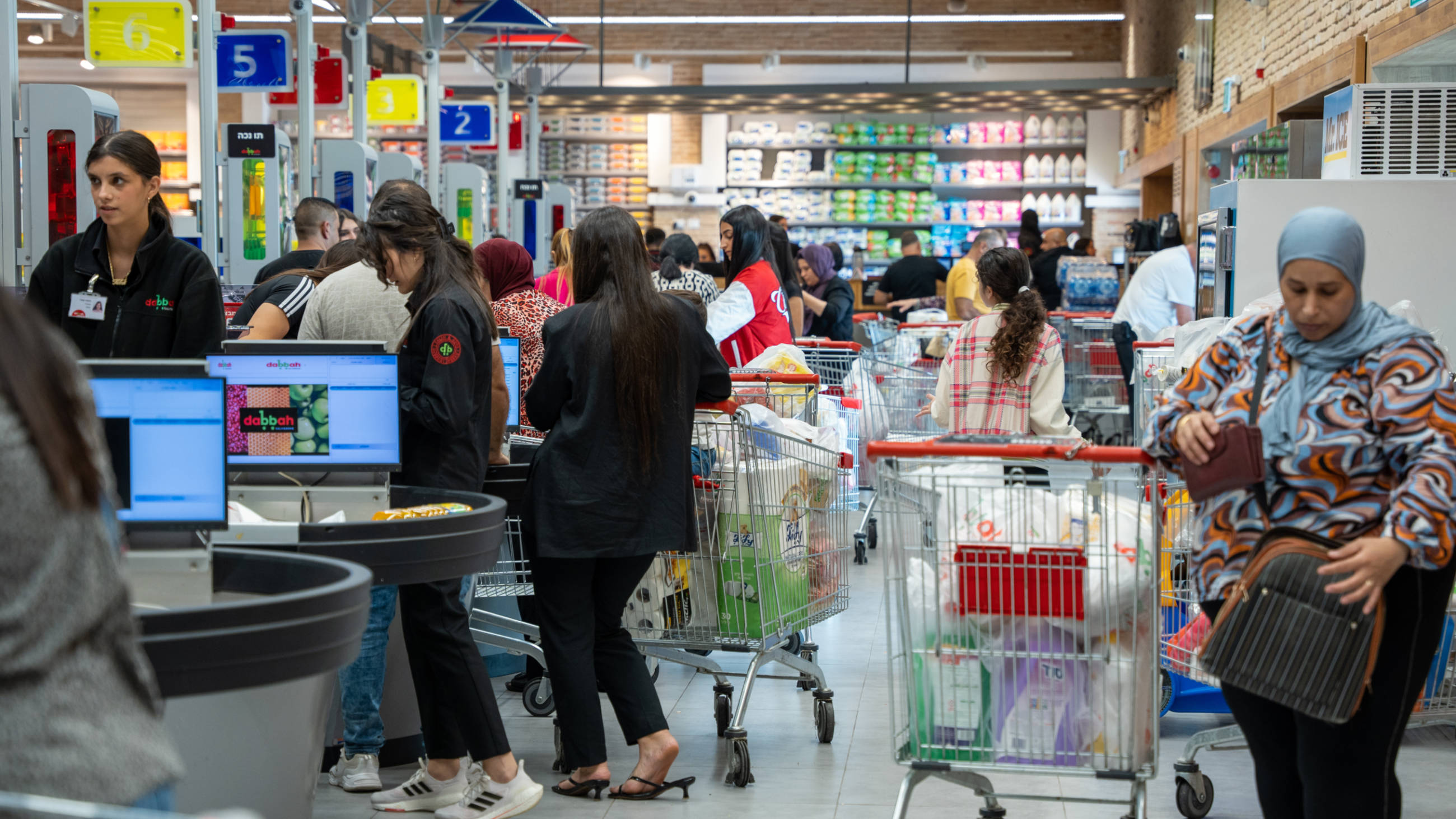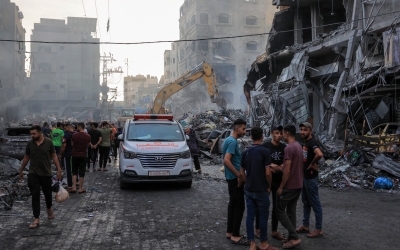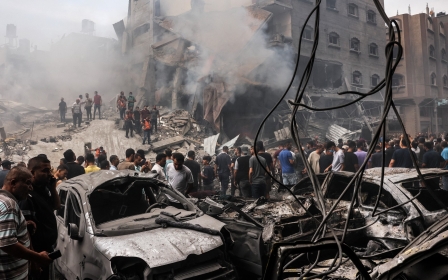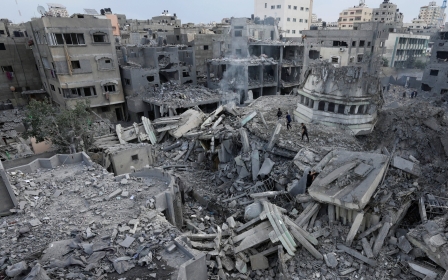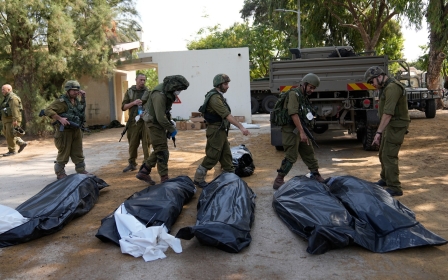Israel-Palestine war: People in northern Israel stockpile food in panic
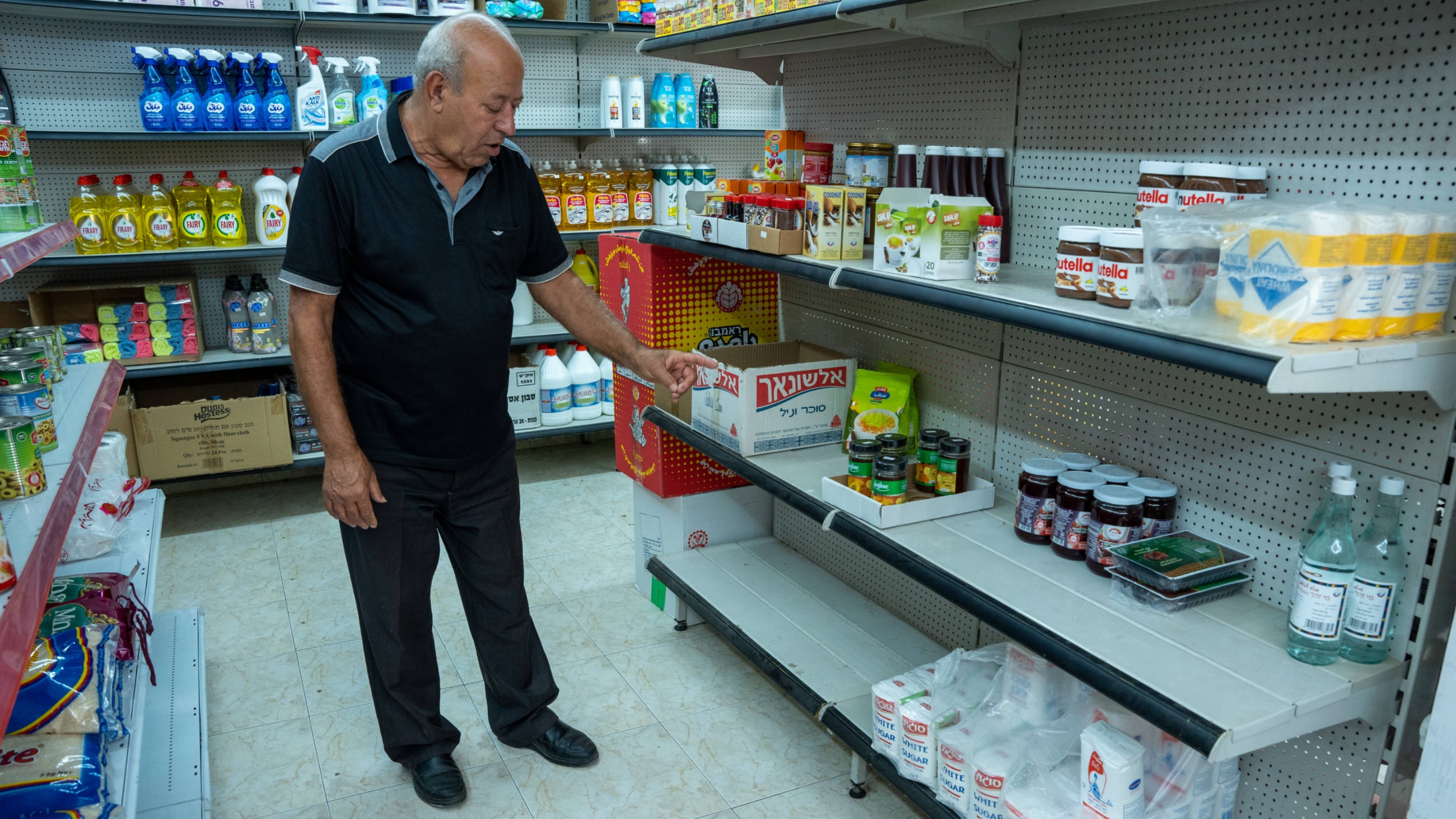
A heated argument unfolds in a Palestinian town in northern Israel between a supermarket owner and a customer, about the amount of water she can buy.
Nadia Almay, the owner, explains that she is trying to divide her supply of water equally among everyone, to ensure that no house remains without water in the coming days.
The customer pleads, "You know my special situation, Mrs Nadia; I don't need to explain, I beg you."
The security situation in northern Israel has been tense since Hamas launched a surprise multi-front assault on Saturday morning. The war has seen the Israeli military pummel Gaza, while Palestinian groups continue to fire thousands of rockets towards Israel.
But although the main battle front is being waged in Israel's south, a state of fear, anxiety and panic is sweeping the northern region in anticipation of an escalation between the Israeli military and Hezbollah. The two sides have exchanged several rounds of cross-border shelling and rocket fire in the past three days.
The scene in Jadeidi al-Makr, a few kilometres east of the city of Akka, is one among several taking place across towns in northern Israel, where people are afraid of being caught unprepared amid a lack of clear instructions from authorities.
"The whole situation seems like a survival mode," Almay told Middle East Eye. "The picture is not entirely clear here in the north, and yet people are hysterically buying. For the first time, I feel like I am becoming evil just because I am trying to distribute water fairly to all customers. You saw it with your eyes," she said.
"We don't bother to arrange the goods on the shelves any more, because the customers rush to take from the boxes.
"Despite that," Almay said, "there is no official announcement about food shortage. Yesterday, our workers tried to supply flour from the mill in Haifa, they came back with an empty truck. This happened also today. I think their priority is supplying the southern settlements."
Not taking risks
Conflicting statements from Israeli authorities on the need to prepare for a worst-case scenario have left citizens in a state of uncertainty.
On Monday afternoon, the Israeli Home Front Command called on citizens to stockpile food for 72 hours, in addition to medicines, water supply of three litres per person per day, battery-operated lighting or flashlight, first-aid kit, personal documents, certificates and cash, equipment and supplies for babies or animals.
But the very next morning, it posted a clarification that these are general recommendations, intended to sharpen public awareness in regards to equipping and staying in the protected area.
Amro Sabaa, branch manager of retail and meat giant Saleh Dabbah and Sons in Deir al-Assad, a village in the Galilee, said while there is no food shortages, the issue has been in supplying them.
"There is a shortage of workers, mainly drivers, because most of the supplies arrive from the ports of the south. People are rushing to buy basic essentials - such as rice, flour, water and canned food - in unusual quantities," Sabaa said.
"Until now, there are no restrictions on the quantities that can be purchased, with the exception of eggs and milk."
It was difficult to ignore the couple standing nearby, pushing a trolley overflowing with supplies. Rani and Maysam Maadi, from Maghar village, were not awaiting instructions from the government, they had come to the shop to prepare for the worst.
'People are rushing to my store as if we are in a state of famine. What use will flour do for us if we do not have a safe shelter?'
- Abu Rami, shop owner
"No one can expect what is going to happen in the north. The distrust is not only because of the conflicting statements, but also because of the whole situation," they said.
"We don't want to take a risk. When we see people being evacuated from their homes from settlements in the north, we will not wait for instructions, we want to be safe."
Like the Maadis, Hanaa Jeries, from the village of Albini, was not taking any chances waiting to see if the war reaches Israel's north.
"I cannot guarantee that the authorities will not change their decisions from one minute to the second. They change their opinions constantly. I prefer to prepare before any curfew is announced," Hanaa said.
Lack of shelters
But as people rush to secure food and other essentials, another urgent question is weighing on people's minds: are public shelters available in Palestinian towns in Israel?
Modar Younis, chairman of the committee of Arab municipal chiefs, told MEE that in terms of shelters, the preparedness in Palestinian towns is limited.
"We are talking about towns whose homes and buildings are mostly old. Even newly constructed houses are not ready because many of them were built without permits, therefore there was no attention or monitoring regarding the issue of security and safety," Younis said.
Even shelters in schools are not ready to host people, he added, because they are being used as classrooms due to a lack of space. It would therefore be difficult to empty them out and prepare them as shelters.
"In any case, it is clear that the preparedness is not enough, and the financial capabilities of the Arab local authorities are limited compared to the newly built Jewish councils, which have huge budgets to build public shelters," Younis said.
For Abu Rami from the village of Albini, the owner of a small grocery store for 37 years, the lack of shelters in Palestinian towns is the most serious issue.
"People are rushing to my store as if we are in a state of famine. The stock of flour has run out, and I do not want to supply it, because merchants began raising prices from the first moment of the war," he said.
"What use will flour do for us if we do not have a safe shelter?"
Middle East Eye propose une couverture et une analyse indépendantes et incomparables du Moyen-Orient, de l’Afrique du Nord et d’autres régions du monde. Pour en savoir plus sur la reprise de ce contenu et les frais qui s’appliquent, veuillez remplir ce formulaire [en anglais]. Pour en savoir plus sur MEE, cliquez ici [en anglais].


